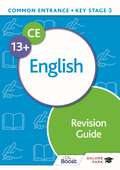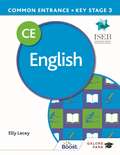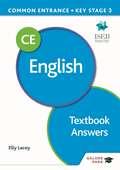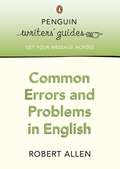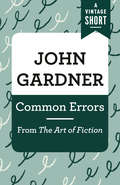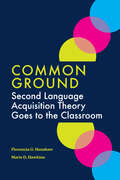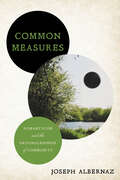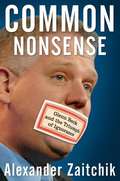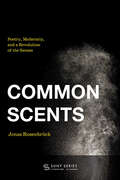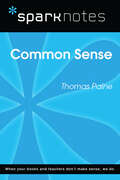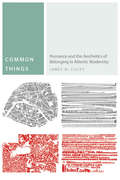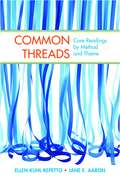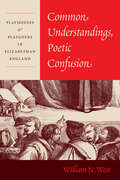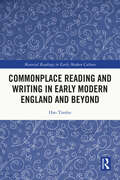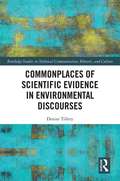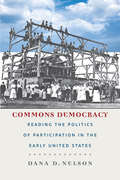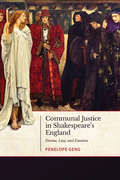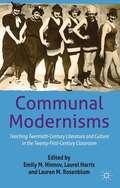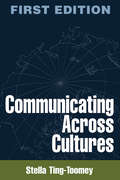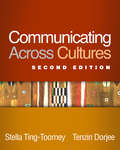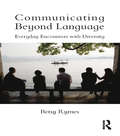- Table View
- List View
Common Entrance 13+ English Revision Guide
by Elly LaceyExam board: ISEB Level: 13+ CE and KS3 Subject: English First exams: November 2022This comprehensive, ISEB-endorsed English guide focuses on revising the specific reading and writing skills needed to meet the requirements of the ISEB CE 13+ exam.· A supportive step-by-step approach to practising key skills for the Reading Paper: narrative viewpoint, poetic techniques or dramatic methods.· Study a diverse range of annotated extracts: modelling ways of analysing extracts in preparation for the Reading Paper.· Hone technique for the Writing Paper: guided support for planning and reviewing written work and sample answers with marking guidance for both directed writing and creative writing tasks.· Prepare for the exam: practice tasks to consolidate revision at the end of each chapter and strategies for performing well in the exam with tips for revising effectively throughout.Continue your revision with Common Entrance 13+ English Exam Practice Questions and Answers (ISBN: 9781398326484).
Common Entrance 13+ English for ISEB CE and KS3
by Elly LaceyExam board: ISEB Level: 13+ CE and KS3 Subject: English First teaching: September 2021 First exams: November 2022Support your pupils in developing a love of reading and enhanced comprehension skills across a wide range of challenging, diverse and engaging themes with the new English series for Common Entrance and Key Stage 3. This new resource will help your pupils achieve their full potential in the ISEB 13+ CE exams and other Independent School exams at 13+.- Expand your pupils' reading preferences: 10 thematically-arranged chapters with topics including: Growing Up, Our Planet, and Journeying.- Boost proficiency in Speaking and Listening: Extensive activities to practice in discussion and group tasks.- Encourage pupils to take responsibility for their learning: Research panels throughout pose questions that encourage pupils to deepen their understanding of a topic or issue independently. Plus, Wider Reading boxes offer suggestions for additional independent reading.- Collaborative reviewing: Regular peer-review tasks to help pupils prepare for the longer writing task in Paper 2 with regular book review sharing opportunities to develop skills in thinking and speaking about literature as well as responding to others' views.- Develop your pupils' appreciation of drama: Greater emphasis on drama skills including: role play, character-development, thought-tracking, directing a short extract, using stage directions, and drafting a short script extract.- Improve exam results: New Exam Skills chapter covers Reading Skills, Writing Skills, Planning and Writing your Responses, and Spelling, Punctuation and Grammar - with sample answers and tips for improving.Accompanying answers available as a paid-for PDF download at galorepark.co.uk (ISBN: 9781398321687).
Common Entrance 13+ English for ISEB CE and KS3
by Elly LaceyExam board: ISEB Level: 13+ CE and KS3 Subject: English First teaching: September 2021 First exams: November 2022Support your pupils in developing enhanced comprehension and writing skills across a wide range of challenging, diverse and engaging themes and genres with Common Entrance English 13+ for ISEB CE and KS3. This new resource will help your pupils achieve their full potential in the ISEB 13+ CE exams and other Independent School exams at 13+.· Expand your pupils' reading preferences: 10 thematically-arranged chapters with topics including Growing Up, Our Planet, Loud and Proud, and Different People, Different Perspectives.· Encourage independent research and learning: Research panels throughout pose questions that encourage pupils to deepen their understanding of a topic or issue independently. Plus, Wider Reading boxes offer suggestions for additional independent reading.· Develop your pupils' appreciation of drama: Greater emphasis on drama skills including role play, character development, thought tracking, directing a short extract, using stage directions, and drafting a short script extract.· Prepare for Paper 2 with end-of-chapter writing tasks: Help your pupils to structure and develop their writing in a variety of genres with directed writing tasks at the end of every chapter.· Improve exam results: New Exam Skills chapter covers Reading Skills, Writing Skills, Planning and Writing your Responses, and Spelling, Punctuation and Grammar - with sample answers and tips for improving.Accompanying answers available as a paid-for PDF download at galorepark.co.uk (ISBN: 9781398321687).
Common Entrance 13+ English for ISEB CE and KS3 Textbook Answers
by Elly LaceyThis PDF download contains full answers to all exercises and activities in Common Entrance 13+ English for ISEB CE and KS3 (ISBN: 9781398321571). · Answers with marks for Reading questions. · Sample answers and mark scheme for Writing questions. · Clear layout saves time marking work, enabling efficient assessment of pupils' strengths and weaknesses. · Advice and guidance to develop pupils' skills. · A sample Scheme of Work presents the CE content which must be covered in preparation for CE 13+. It is possible to deliver the content in a number of different ways and we present an option that can be followed or adapted. As a downloadable PDF, please note this resource is non-refundable.
Common Entrance 13+ English for ISEB CE and KS3 Textbook Answers
by Elly LaceyThis resource contains full answers to all exercises and activities in Common Entrance 13+ English for ISEB CE and KS3 (ISBN: 9781398321571). · Answers with marks for Reading questions. · Sample answers and mark scheme for Writing questions. · Clear layout saves time marking work, enabling efficient assessment of pupils' strengths and weaknesses. · Advice and guidance to develop pupils' skills. · A sample Scheme of Work presents the CE content which must be covered in preparation for CE 13+. It is possible to deliver the content in a number of different ways and we present an option that can be followed or adapted.Please note this resource is non-refundable.
Common Errors and Problems in English
by Robert AllenThe Penguin Writers' Guides series provide authoritative, succinct and easy-to-follow guidance on specific aspects of written English. Whether you need to brush up your skills or get to gris with something for the first time, these invaluable Guides will help you find the best way to get your message across clearly and effectively.Common Errors in English is a thorough A-Z checklist of the mistakes that often crop up in all aspects of written English. It gives ready and authoritative guidance on today's usage difficulties, being up-to-date with all the latest controversies, pitfalls and oddities of our language. Written in a lively style, with plenty of interest and humour, Common Errors shouldn't be far from the fingertips of anyone who does any kind of writing.
Common Errors: From The Art of Fiction (A Vintage Short)
by John GardnerA Vintage Shorts selection.In this chapter from his classic instructive handbook, The Art of Fiction, John Gardner illustrates the principles and techniques of good writing. Poor diction, confusing clauses, undue sentimentality and mannerism—these are pitfalls that plague experienced writers as well as those new to the craft. Exemplified with detailed excerpts from classic works of literature, Gardner explores how to achieve vivid, sensuous prose and how to avoid clumsy writing. All those who aspire to learn how to master the craft of fiction will be wise to begin with Gardner’s invaluable advice.An ebook short.
Common Ground: Second Language Acquisition Theory Goes to the Classroom
by Florencia G. Henshaw Maris D. Hawkins&“Common Ground is accessible to teachers at all levels yet firmly rooted in current questions of second language acquisition (SLA). One of its primary strengths is the authors themselves, both of whom are accomplished language teachers who understand the challenges and opportunities in communication-focused language teaching. Their experience, expertise, insight, and enthusiasm for language teaching translate into a book that is refreshingly practical for teachers, especially teachers who are striving to break from traditional drills commonly presented in textbooks. I hope this book finds its way into the hands of every language teacher who is looking for concrete examples of how SLA principles meet the realities of the classroom."—Stacey Margarita Johnson, Vanderbilt University
Common Measures: Romanticism and the Groundlessness of Community
by Joseph AlbernazWhat happens to the experience of community when the grounds of communal life collapse? The Romantic period's upheaval cast both traditional communal organizations of life and outgrowths of the new revolutionary age into crisis. In this context, Joseph Albernaz argues that Romantic writers articulate a vital conception of "groundless community," while following this idea through its aesthetic, ecological, political, and philosophical registers into the present. Amidst the violent expropriation of the commons, Romantic writers including the Wordsworths, Clare, Hölderlin, and the revolutionary abolitionist Robert Wedderburn reimagined the forms of their own lives through literature to conceive community as groundless, a disposition toward radically open forms of sharing—including with nonhuman beings—without recourse to any collective identity. Both a poetics and ethics, groundless community names an everyday sociality that surges beneath and against the enclosures of property and identity, binding us to the movements of the earth. Unearthing Romanticism's intersections with the history of communism and the general strike, Albernaz also demonstrates how Romantic literature's communal imagination reverberates through later theories of community in Bataille, Derrida, Nancy, Moten, and others. With sharp close readings, new historical constellations, and innovative theoretical paradigms, Common Measures recasts the relationship of the Romantic period to the basic terms of modernity.
Common Nonsense: Glenn Beck and the Triumph of Ignorance
by Alexander ZaitchikWho is this guy and why are people listening? Forget Rush Limbaugh, Bill O'Reilly, and Sean Hannity--Glenn Beck is the right's new media darling and the unofficial leader of the conservative grassroots. Lampooned by the left and lionized by the far right, his bluster-and-tears brand of political commentary has commandeered attention on both sides of the aisle. Glenn Beck has emerged over the last decade as a unique and bizarre conservative icon for the new century. He fantasizes aloud about killing his political opponents and encourages his listeners to embrace a cynical paranoia that slides easily into a fantasyland filled with enemies that do not exist, and solutions that are incoherent, at best. Since the election of Barack Obama, Beck's bombastic, conspiratorial, and often viciously personal approach to political combat has made him one of the most controversial figures in the history of American broadcasting. In Common Nonsense, investigative reporter Alexander Zaitchik explores Beck's strange brew of ratings lust, boundless ego, conspiratorial hard-right politics, and gimmicky morning-radio entertainment chops. Separates the facts from the fiction, following Beck from his troubled childhood to his recent rise to the top of the conservative media heap. Zaitchik's recent three-part series in Salon caused so much buzz, Beck felt the need to attack it on his show. Based on Zaitchik's interviews with former Beck coworkers and review of countless Beck writings and television and radio shows. Examines Beck's high-profile obsessions (Acorn and Van Jones) as well as his lesser-known influences (obscure Mormon radicals like Cleon Skousen.) Zaitchik's writing has appeared in the New Republic, the Nation, Salon, Wired, the New York Times, and AlternetBeck, a perverse and high-impact media spectacle, has emerged as a leader in a conservative protest movement that raises troubling questions about the health of American democracy.
Common Scents: Poetry, Modernity, and a Revolution of the Senses (SUNY series, Literature . . . in Theory)
by Jonas RosenbrückThe sense of smell has long been the most neglected of the human senses in literature. Common Scents sets out to undo this forgetting of olfactory sense-making by tracing the appearance of odors in modern German and French poetry. Jonas Rosenbrück argues that smell's persistence undermines modernity's self-image as an ocular age and shows how scents index a veritable "revolution of the senses." Such a revolution, as a redistribution of the senses, would make the common and shared character of our existence in scented atmospheres perceptible.Bringing contemporary ecocritical interest in atmospheres, air, and the senses into dialogue with literary criticism, theories of modernity, and political philosophy, Common Scents provides novel interpretations of figures such as Friedrich Hölderlin, Charles Baudelaire, Friedrich Nietzsche, and Bertolt Brecht. These readings demonstrate how all terrestrial life is interlinked in the aerial commons that escapes the privatizing grasp of what Karl Marx called the "sense of having." Reformulating Bruno Latour, Rosenbrück argues that we have never been deodorized. In attending to this fact, Common Scents reconfigures subjectivity, corporeality, and politics.
Common Sense (SparkNotes Literature Guide Series)
by SparkNotesCommon Sense (SparkNotes Literature Guide) by Thomas Paine Making the reading experience fun! Created by Harvard students for students everywhere, SparkNotes is a new breed of study guide: smarter, better, faster.Geared to what today's students need to know, SparkNotes provides:chapter-by-chapter analysis explanations of key themes, motifs, and symbols a review quiz and essay topics Lively and accessible, these guides are perfect for late-night studying and writing papers.
Common Things: Romance and the Aesthetics of Belonging in Atlantic Modernity (Commonalities)
by James D. LilleyWhat are the relationships between the books we read and the communities we share? Common Things explores how transatlantic romance revivals of the eighteenth and nineteenth century influenced—and were influenced by—emerging modern systems of community.Drawing on the work of Washington Irving, Henry Mackenzie, Thomas Jefferson, James Fenimore Cooper, Robert Montgomery Bird, and Charles Brockden Brown, the book shows how romance promotes a distinctive aesthetics of belonging—a mode of being in common tied to new qualities of the singular. Each chapter focuses on one of these common things—the stain of race, the “property” of personhood, ruined feelings, the genre of a text, and the event of history—and examines how these peculiar qualities work to sustain the coherence of our modern common places. In the work of Horace Walpole and Edgar Allan Poe, the book further uncovers an important— and never more timely—alternative aesthetic practice that reimagines community as an open and fugitive process rather than as a collection of common things.
Common Threads: Core Readings By Method and Theme
by Jane E. Aaron Ellen Kuhl RepettoCommon Threads is a brief nonfiction reader with concise but comprehensive reading and writing instruction. Its unique rhetorical and thematic organization allows teachers to seamlessly blend it into their existing curricula. With brief high-interest readings, probing questions, extensive writing suggestions, and practical reading and writing instruction, Common Threads gives students all the instruction, practice, and support they need to engage with complex texts.
Common Understandings, Poetic Confusion: Playhouses & Playgoers in Elizabethan England
by William N. WestA new account of playgoing in Elizabethan England, in which audiences participated as much as performers. What if going to a play in Elizabethan England was more like attending a football match than a Broadway show—or playing in one? In Common Understandings, Poetic Confusion, William N. West proposes a new account of the kind of participatory entertainment expected by the actors and the audience during the careers of Shakespeare and his contemporaries. West finds surprising descriptions of these theatrical experiences in the figurative language of early modern players and playgoers—including understanding, confusion, occupation, eating, and fighting. Such words and ways of speaking are still in use today, but their earlier meanings, like that of theater itself, are subtly, importantly different from our own. Playing was not confined to the actors on the stage but filled the playhouse, embracing audiences and performers in collaborative experiences that did not belong to any one alone but to the assembled, various crowd. What emerged in playing was a kind of thinking and feeling distributed across persons and times that were otherwise distinct. Thrown apples, smashed bottles of beer, and lumbering bears—these and more gave verbal shape to the physical interactions between players and playgoers, creating circuits of exchange, production, and consumption.
Commonplace Reading and Writing in Early Modern England and Beyond (Material Readings in Early Modern Culture)
by Hao TianhuApproaching from bibliographical, literary, cultural, and intercultural perspectives, this book establishes the importance of Hesperides, or the Muses’ Garden, a largely unexplored manuscript commonplace book to early modern English literature and culture in general. Hesperides, or the Muses’ Garden is a seventeenth-century manuscript commonplace book known primarily for its Shakespearean connections, which extracts works by dozens of early modern English authors, including Shakespeare, Bacon, Ben Jonson, and Milton. This book sheds light on the broader significance of Hesperides that refashions our full knowledge of early modern authorship and plagiarism, composition, reading practice, and canon formation. Following two introductory chapters are three topical chapters, which respectively discuss plagiarism and early modern English writing, early modern English reading practice, and early modern English canon formation. The final chapter further expands the field to ancient China, comparing commonplace books with Chinese leishu, exploring Matteo Ricci’s cross-cultural commonplace writing, and re-reading Shakespeare’s sonnets in light of Ricci’s On Friendship. The solid book will serve as a must read for scholars and students of early modern English literature, manuscript study, commonplace books, history of the book, and intercultural study.
Commonplaces of Scientific Evidence in Environmental Discourses (Routledge Studies in Technical Communication, Rhetoric, and Culture)
by Denise TilleryThis book focuses on the uses of scientific evidence within three types of environmental discourses: popular nonfiction books about the environment; traditional and social media texts created by a grassroots environmental group; and a set of data displays that make arguments about global warming in a variety of media and contexts. It traces the operations of eight commonplaces about science and shows how they recur throughout these contexts, starting with Rachel Carson’s Silent Spring and ending with contemporary blogs and social media. The commonplaces are shown to embed ideological assumptions and simultaneously challenge those assumptions. In addition, the book addresses the potential dangers involved in relying too heavily on aspects of these commonplaces, and how they can undermine the goals of some of the writers who use them.
Commons Democracy: Reading the Politics of Participation in the Early United States
by Dana D. NelsonCommons Democracy highlights a poorly understood dimension of democracy in the early United States. It tells a story that, like the familiar one, begins in the Revolutionary era. But instead of the tale of the Founders’ high-minded ideals and their careful crafting of the safe framework for democracy—a representative republican government—Commons Democracy examines the power of the democratic spirit, the ideals and practices of everyday people in the early nation. As Dana D. Nelson reveals in this illuminating work, the sensibility of participatory democratic activity fueled the involvement of ordinary folk in resistance, revolution, state constitution-making, and early national civic dissent. The rich variety of commoning customs and practices in the late colonies offered non-elite actors a tangible and durable relationship to democratic power, one significantly different from the representative democracy that would be institutionalized by the Framers in 1787. This democracy understood political power and liberties as communal, not individual.Ordinary folk practiced a democracy that was robustly participatory and insistently local. To help tell this story, Nelson turns to early American authors—Hugh Henry Brackenridge, James Fenimore Cooper, Robert Montgomery Bird, and Caroline Kirkland—who were engaged with conflicts that emerged from competing ideals of democracy in the early republic, such as the Whiskey Rebellion and the Anti-Rent War as well as the enclosure of the legal commons, anxieties about popular suffrage, and practices of frontier equalitarianism. While Commons Democracy is about the capture of “democracy” for the official purposes of state consolidation and expansion, it is also a story about the ongoing (if occluded) vitality of commons democracy, of its power as part of our shared democratic history and its usefulness in the contemporary toolkit of citizenship.
Communal Justice in Shakespeare’s England: Drama, Law, and Emotion
by Penelope GengThe sixteenth century was a turning point for both law and drama. Relentless professionalization of the common law set off a cascade of lawyerly self-fashioning – resulting in blunt attacks on lay judgment. English playwrights, including Shakespeare, resisted the forces of legal professionalization by casting legal expertise as a detriment to moral feeling. They celebrated the ability of individuals, guided by conscience and working alongside members of their community, to restore justice. Playwrights used the participatory nature of drama to deepen public understanding of and respect for communal justice. In plays such as King Lear and Macbeth, lay people accomplish the work of magistracy: conscience structures legal judgment, neighbourly care shapes the coroner’s inquest, and communal emotions give meaning to confession and repentance. An original and deeply sourced study of early modern literature and law, Communal Justice in Shakespeare’s England contributes to a growing body of scholarship devoted to the study of how drama creates and sustains community. Penelope Geng brings together a wealth of imaginative and documentary archives – including plays, sermons, conscience literature, Protestant hagiographies, legal manuals, and medieval and early modern chronicles – proving that literature never simply reacts to legal events but always actively invents legal questions, establishes legal expectations, and shapes legal norms.
Communal Modernisms
by Emily M. Hinnov Laurel Harris Lauren M. RosenblumDrawing from recent research that seeks to expand our understanding of modernism, this volume offers practical pedagogical approaches for teaching modernist literature and culture in the twenty-first century classroom.
Communicate! (Fourteenth Edition)
by Rudolph F. Verderber Kathleen S. Verderber Deanna D. SellnowNow in its 14th edition, this ground-breaking, market-leading fundamentals of human communication text helps readers improve their communication competency by becoming proficient in using theory and research-grounded communication skills. Praised for its clear and concise writing style, this new edition includes increased coverage of how technology and social media are changing communication practices and offers guidelines for best practice. Lively contemporary examples and sample speeches ground theory, increase comprehension, and help readers become skillful communicators. COMMUNICATE! engages students in active learning through theory, application and skill-building exercises including speech action step activities that guide students through the speech preparation process. The role of ethics in communication is integrated throughout the text, and students can also apply ethical principles to case situations.
Communicating Across Cultures
by Stella Ting-ToomeyFrom high-level business negotiations to casual conversations among friends, every interpersonal interaction is shaped by cultural norms and expectations. Seldom is this more clearly brought to light than in encounters between people from different cultural backgrounds, when dissimilar communication practices may lead to frustration and misunderstanding. This thought-provoking text presents a new framework for understanding the impact of culture on communication and for helping students build intercultural communication competence. With illustrative examples from around the globe, the book shows that verbal and nonverbal communication involves much more than transmitting a particular message it also reflects each participant's self-image, group identifications and values, and privacy and relational needs. Readers learn to move effectively and appropriately through a wide range of transcultural situations by combining culture-specific knowledge with mindful listening and communication skills. Throughout, helpful tables and charts and easy-to-follow guidelines for putting concepts into practice enhance the book's utility for students.
Communicating Across Cultures, Second Edition: Esl Learners In The Non-esl Classroom (The\guilford Communication Ser.)
by Stella Ting-Toomey Tenzin DorjeeThis highly regarded text--now revised and expanded with 50% new material--helps students and professionals mindfully build their knowledge and competencies for effective intercultural communication in any setting. The authors' comprehensive, updated theoretical framework (integrative identity negotiation theory) reveals how both verbal and nonverbal communication are affected by multilayered facets of identity. Written in a candid, conversational style, the book is rich with engaging examples illustrating cultural conflicts and misunderstandings that arise in workplace, educational, interpersonal, and community contexts. Readers learn how to transform polarized conversations into successful intercultural engagements by combining knowledge about culture with mindful listening and communication skills. New to This Edition *Extensively revised to reflect the ongoing development of integrative identity negotiation theory, nearly 20 years of research advances, the growing diversity of the United States, and global trends. *Chapter providing a mindfulness lens on intercultural and intergroup communication competence. *Chapter on culture shock in sojourners (international students, global businesspeople, and others). *Chapter on immigrants' acculturation processes. *Lively chapter-opening case examples, including compelling personal stories from the authors and others from diverse cultures. *End-of-chapter summaries, "Mindful Guidelines" to put into practice, and critical thinking questions. *New and expanded discussions of hot topics: cross-cultural workplaces, community building, peace building, romantic relationships, prejudice and discrimination, microaggressions, and ethical issues.
Communicating Affection
by Kory FloydExplores how and why people express affection, the many positive effects it can have, and the risks it often carries.
Communicating Beyond Language: Everyday Encounters with Diversity
by Betsy RymesThis new book offers a timely and lively appraisal of the concept of communicative repertoires, resources we use to express who we are when in dialogue with others. Each chapter describes and illustrates the communicative resources humans deploy daily, but rarely think about – not only the multiple languages we use, but how we dress or gesture, how we greet each other or tell stories, the nicknames we coin, and the mass media references we make – and how these resources combine in infinitely varied performances of identity. Rymes also discusses how our repertoires shift and grow over the course of a lifetime, as well how a repertoire perspective can lead to a rethinking of cultural diversity and human interaction, from categorizing people’s differences to understanding how our repertoires can expand and overlap with other, thereby helping us to find common ground and communicate in increasingly multicultural schools, workplaces, markets, and social spheres. Rymes affirms the importance of the communicative repertoires concept with highly engaging discussions and contemporary examples from mass media, popular culture, and everyday life. The result is a fresh and exciting work that will resonate with students and scholars in sociolinguistics, intercultural communication, applied linguistics, and education.
